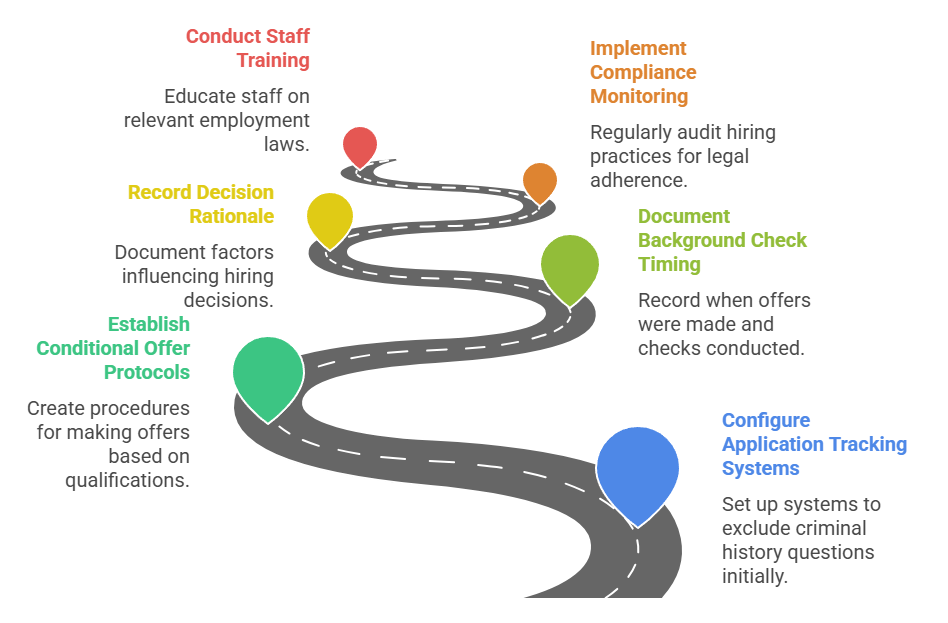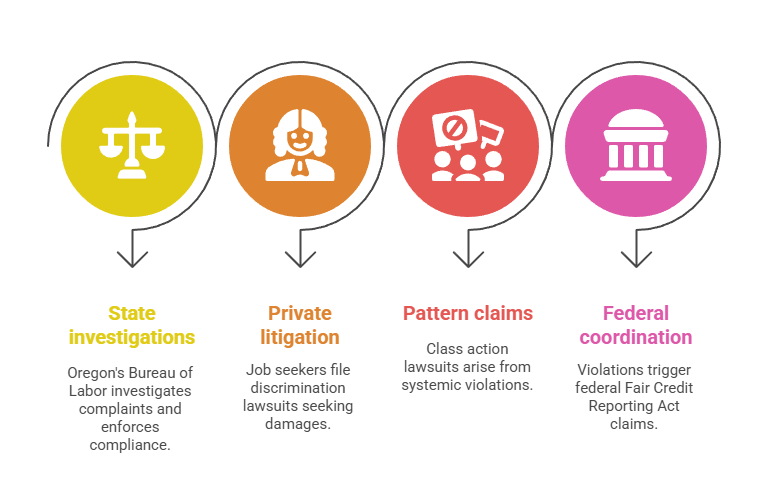Oregon's comprehensive fair chance employment laws, including the statewide Ban the Box Act, create some of the nation's most robust protections for job seekers with criminal histories. These progressive regulations significantly limit when and how employers can conduct criminal background checks, fundamentally reshaping hiring practices across the state.
Key Takeaways
- Oregon's Ban the Box law prohibits employers with six or more employees from asking about criminal history on initial job applications.
- Criminal background checks can only be conducted after a conditional job offer is made, with specific procedures required for adverse decisions.
- The Fair Chance Employment Act provides additional protections and establishes clear guidelines for considering criminal history in hiring decisions.
- Portland and other municipalities have enacted even stricter local ordinances that may supersede state requirements.
- Violations can result in civil penalties up to $1,000 per violation, plus potential discrimination lawsuits and reputational damage.
- Oregon's expungement and record sealing laws create additional opportunities for individuals to improve their employment prospects.
Understanding Oregon's Ban the Box Employment Framework
Oregon implemented its statewide Ban the Box legislation in 2016. This positioned the state as a leader in fair chance employment practices. The law fundamentally changes how Oregon employers approach criminal history employment screening by removing barriers that traditionally prevented qualified candidates from even getting their foot in the door.
The legislation applies to all Oregon employers with six or more employees. It covers both public and private sector hiring. Unlike some states that only apply Ban the Box requirements to public employers, Oregon's comprehensive approach ensures broad protection for job seekers across industries. The law works in conjunction with other state and local fair chance employment measures. This creates a multi-layered framework of protections.
Understanding these requirements remains crucial for both job seekers and employers navigating Oregon's employment landscape in 2025. The state's approach goes beyond simply removing the criminal history checkbox. Instead, it establishes detailed procedures for when and how criminal background information can be considered in hiring decisions. This progressive approach reflects Oregon's commitment to reducing recidivism and promoting successful reentry into the workforce.
Oregon Ban the Box Compliance Requirements for Employers

Oregon's ban the box compliance checklist requires employers to understand both application restrictions and post-offer procedures. The state has maintained its 2016 framework while adding enforcement clarity through recent guidance updates. Employers must navigate these requirements carefully to avoid violations that could result in significant penalties.
Application and Initial Screening Restrictions
Oregon employers cannot include questions about criminal history on job applications or during initial interviews. This prohibition extends to all forms of preliminary screening. These include online applications, paper forms, and verbal inquiries during initial contact with candidates.
The restriction applies specifically to questions about arrests without conviction, juvenile records, expunged or sealed records, and general criminal history inquiries. Employers must wait until after making a conditional job offer before conducting criminal background checks or asking criminal history questions. This ensures that qualified individuals receive fair consideration based on their skills and qualifications first.
Post-Conditional Offer Procedures
Once a conditional job offer is made, Oregon employers can conduct criminal background checks and inquire about criminal history. However, the law establishes specific procedural requirements that employers must follow when considering this information. The conditional offer must be genuine and based on the candidate's qualifications. It cannot be a formality designed to circumvent Ban the Box protections.
If criminal history information leads an employer to consider withdrawing the offer, they must follow Oregon's fair chance employment procedures. This includes providing notice and opportunity for the candidate to respond. These procedures ensure that criminal history is evaluated fairly and in context rather than used as an automatic disqualifier.
Oregon Fair Chance Employment Act Requirements
The Fair Chance Employment Act works alongside Oregon's Ban the Box law to establish comprehensive protections. This legislation provides detailed guidance on how employers should evaluate criminal history information when making hiring decisions. It emphasizes individualized assessment rather than blanket exclusions.
Under the Act, employers must consider several factors when evaluating criminal history. These include the nature and gravity of the offense, the time elapsed since conviction, and the relationship between the criminal conduct and the specific job duties. This multifactor analysis ensures that criminal history is considered in context. It prevents automatic barriers to employment based solely on the existence of a criminal record.
| Requirement | Timeline | Details |
| Initial Notice | Before adverse action | Must include copy of background report and explanation of rights |
| Response Period | Minimum 5 business days | Candidate can provide additional information or challenge accuracy |
| Final Decision | After response period | Employer must provide written explanation if proceeding with adverse action |
These procedural safeguards create meaningful opportunities for candidates to address concerns and provide context about their criminal history. The law recognizes that circumstances surrounding criminal convictions vary widely and deserve individualized consideration.
Local Oregon Employment Screening Ordinances
Several Oregon municipalities have enacted local Ban the Box ordinances that exceed state requirements. These local laws create additional obligations for employers operating within specific jurisdictions. Therefore, employers must research and comply with applicable local requirements in addition to state law obligations.
Portland's Enhanced Protections
Portland has implemented additional fair chance employment requirements that go beyond state law. The city's ordinance applies to employers with six or more employees and includes enhanced protections for job seekers with criminal histories. Portland's law provides stricter timelines and additional procedural requirements that employers must navigate alongside state obligations.
Key differences in Portland's ordinance include expanded notice requirements and longer response periods for candidates to address criminal history concerns. Employers operating in Portland must ensure compliance with both state and local requirements. They must follow the more restrictive standard when laws differ. This layered approach provides even stronger protections for job seekers while creating additional compliance obligations for employers.
Other Municipal Requirements
Other Oregon cities including Eugene, Salem, and Corvallis have enacted varying local fair chance employment ordinances. These local laws may apply to different employer sizes, include additional protected categories, or establish alternative compliance procedures. Consequently, employers with operations in multiple Oregon jurisdictions must maintain awareness of local variations and ensure compliance across all locations.
Criminal Background Check Best Practices in Oregon
Oregon employers should develop comprehensive policies that ensure compliance with both Ban the Box requirements and fair chance employment standards. Effective policies clearly outline when background checks can be conducted, what information can be considered, and how adverse decisions will be made and communicated to candidates. Additionally, training programs for hiring managers and HR personnel are essential for consistent compliance across the organization.
Staff involved in hiring decisions should understand the legal requirements. They must recognize prohibited inquiries and know how to properly evaluate criminal history information when it becomes relevant in the hiring process. Documentation practices should support compliance efforts while protecting candidate privacy. Regular policy updates ensure continued compliance as laws evolve and new requirements are implemented.

- Application tracking systems: Configure to prevent criminal history questions during initial screening phases
- Conditional offer protocols: Establish clear procedures for making genuine offers based on qualifications alone
- Background check timing: Document when conditional offers were made and background checks conducted
- Decision rationale processes: Record the specific factors considered when criminal history influences hiring decisions
- Compliance monitoring schedules: Regularly audit hiring practices to ensure ongoing adherence to legal requirements
- Staff training programs: Provide ongoing education about Oregon criminal history employment laws and updates
These comprehensive approaches help employers maintain compliance while building effective fair chance hiring programs. Regular review and updates ensure policies remain current with evolving legal requirements.
Oregon Expungement and Employment Opportunities
Oregon's expungement and record sealing laws provide important opportunities for individuals to improve their employment prospects. Recent legislative updates have expanded eligibility for expungement and created new categories of records that can be sealed from public view. These legal remedies can effectively eliminate barriers to employment for qualifying individuals, particularly when combined with Ban the Box protections.
The state has streamlined its expungement processes in recent years. This makes it easier for eligible individuals to clear their records and access expanded employment opportunities. Understanding these options is crucial for job seekers with criminal histories who want to maximize their employment prospects under Oregon's fair chance framework. Moreover, employers should understand their obligations regarding expunged records to ensure proper compliance.
Record Sealing and Employment Impact
When criminal records have been legally expunged or sealed under Oregon law, employers generally cannot access or consider this information in hiring decisions. Job seekers are typically not required to disclose expunged convictions. Employers who somehow obtain this information cannot use it as a basis for employment decisions.
However, certain regulated industries or positions may have different requirements regarding access to sealed records. Employers in these sectors should consult with legal counsel to understand their specific obligations. Any exceptions that may apply to their hiring practices should be clearly documented and consistently applied.
Employer Obligations Regarding Sealed Records
The distinction between expunged and sealed records creates different obligations for employers conducting background checks. Expunged records are generally treated as if they never occurred. Sealed records may be accessible under certain circumstances but cannot be considered in most employment decisions.
| Record Type | Employer Access | Employment Consideration | Disclosure Requirements |
| Expunged | Generally prohibited | Cannot be considered | Job seeker not required to disclose |
| Sealed | Limited access in specific circumstances | Usually cannot be considered | Varies by situation |
| Public | Standard background check access | Subject to fair chance evaluation | Must follow individualized assessment |
Employers should establish clear procedures for handling different types of criminal record information. This ensures consistent compliance across all hiring decisions while respecting the intent of Oregon's expungement and sealing laws.
Penalties and Enforcement for Oregon Employment Screening Violations
Violations of Oregon's Ban the Box and fair chance employment laws can result in significant penalties and legal exposure for employers. The state can impose civil penalties up to $1,000 per violation. Each prohibited inquiry or improper use of criminal history potentially constitutes a separate violation. Therefore, these penalties can accumulate quickly for employers with systemic compliance failures.
Beyond state penalties, employers may face discrimination lawsuits from affected job seekers under Oregon's civil rights laws. These private lawsuits can result in substantial damages. This includes back pay, front pay, emotional distress compensation, and attorney's fees. The reputational impact of discrimination claims can also create long-term business consequences that extend far beyond immediate legal costs.

- State agency investigations: Oregon's Bureau of Labor and Industries investigates complaints and enforces compliance through formal proceedings
- Private litigation options: Individual job seekers can file discrimination lawsuits in state court seeking monetary damages and injunctive relief
- Pattern and practice claims: Class action lawsuits may arise when employers have systemic violations affecting multiple candidates over time
- Federal coordination mechanisms: Some violations may also trigger federal Fair Credit Reporting Act or Title VII claims creating additional liability exposure
Proactive compliance efforts are far more cost-effective than defending against violations after they occur. Employers should invest in training, policy development, and compliance monitoring to prevent violations.
Second Chance Employment Programs and Resources
Oregon has developed numerous programs and resources to support second chance employment initiatives throughout the state. These programs connect employers with qualified candidates who have criminal histories while providing support services that benefit both job seekers and hiring organizations. Understanding available resources can help employers build effective fair chance hiring programs that go beyond basic legal compliance.
State-sponsored workforce development programs offer training, job placement assistance, and ongoing support for individuals with criminal histories. These programs often include employer incentives. For example, tax credits, wage subsidies, and risk mitigation resources make second chance hiring more attractive and sustainable for businesses. Community partnerships between employers, nonprofit organizations, and government agencies create comprehensive support networks that benefit all participants.
Oregon Criminal History Employment Laws: Recent Updates and Future Trends
As Oregon continues to refine its approach to fair chance employment, several trends have emerged that may influence future legislative developments. The state has shown increasing interest in expanding protections and streamlining compliance processes. Recent discussions in the Oregon Legislature have focused on potential expansions of Ban the Box coverage and enhanced enforcement mechanisms.
Employers should stay informed about pending legislation and regulatory updates that could affect their hiring practices. The Oregon Bureau of Labor and Industries regularly issues guidance updates and clarification documents. These help employers understand their obligations under current law. Additionally, court decisions interpreting Oregon's fair chance employment laws continue to shape practical compliance requirements.
Emerging Compliance Considerations
Technology changes in background screening and artificial intelligence hiring tools create new compliance challenges under Oregon's fair chance employment framework. Employers using automated screening systems must ensure these tools comply with Ban the Box timing restrictions. They cannot inadvertently screen out candidates based on criminal history during prohibited phases of the hiring process.
Social media screening and online reputation checks may also implicate Oregon's fair chance employment protections. Employers should carefully consider whether information obtained through these methods constitutes criminal history information subject to the law's restrictions. Clear policies addressing these emerging issues help maintain compliance while leveraging new hiring technologies.
Best Practices for 2025 and Beyond
Oregon employers should focus on building comprehensive fair chance hiring programs that exceed minimum legal requirements. This includes developing relationships with community organizations, implementing mentorship programs, and creating supportive workplace environments for employees with criminal histories. These proactive approaches demonstrate genuine commitment to second chance employment while potentially reducing legal risks.
Regular legal reviews and policy updates ensure continued compliance as Oregon's employment screening laws continue to evolve. Employers should also consider the business benefits of fair chance hiring. These include access to motivated talent pools, positive community relationships, and enhanced corporate reputation for social responsibility.
Conclusion
Oregon's comprehensive approach to fair chance employment, anchored by its statewide Ban the Box law and Fair Chance Employment Act, creates significant opportunities for job seekers with criminal histories while establishing clear compliance obligations for employers. The state's progressive framework goes beyond simply removing barriers to include detailed procedural protections and support systems that benefit both candidates and hiring organizations. Success in this regulatory environment requires understanding not only the basic prohibition on criminal history inquiries during initial screening but also the nuanced requirements for conducting individualized assessments when criminal history becomes relevant. Employers who embrace these requirements as opportunities to access qualified talent while supporting community reintegration will find themselves well-positioned in Oregon's evolving employment landscape throughout 2025 and beyond.
Frequently Asked Questions
When can Oregon employers ask about criminal history during the hiring process?
Oregon employers with six or more employees cannot ask about criminal history until after making a conditional job offer. Once a genuine conditional offer is made based on qualifications, employers can conduct background checks and inquire about criminal history. However, they must follow specific procedural requirements if considering adverse action.
Do all Oregon employers have to follow Ban the Box requirements?
Oregon's statewide Ban the Box law applies to employers with six or more employees, including both private and public sector organizations. Smaller employers with fewer than six employees are not covered by the state law. However, they may be subject to local municipal ordinances with different thresholds.
What happens if an Oregon employer violates Ban the Box requirements?
Violations can result in civil penalties up to $1,000 per violation imposed by the state, plus potential discrimination lawsuits from affected job seekers. Employers may also face reputational damage and federal Fair Credit Reporting Act claims depending on the specific violation circumstances.
Are there exceptions to Oregon's criminal history employment screening restrictions?
Certain regulated industries and positions may have different requirements, particularly those involving vulnerable populations or requiring specific licensing. However, these exceptions are limited. Employers should consult legal counsel to determine if any exceptions apply to their specific situation.
How does Oregon's expungement law affect employment background checks?
When criminal records have been legally expunged or sealed under Oregon law, employers generally cannot access or consider this information in hiring decisions. Job seekers typically don't need to disclose expunged convictions. Employers who obtain this information cannot use it for employment decisions.
What should Oregon job seekers know about their rights under Ban the Box laws?
Job seekers have the right to apply for positions without initial criminal history disclosure and receive individualized assessment if criminal history becomes relevant. They can get proper notice before adverse action and have opportunity to respond with additional information or corrections about their criminal background.
How do Portland's fair chance employment laws differ from state requirements?
Portland has implemented additional fair chance employment requirements that go beyond state law, including enhanced protections and stricter procedural requirements. Employers operating in Portland must ensure compliance with both state and local requirements, following the more restrictive standard when laws differ.
What resources are available to help Oregon employers implement fair chance hiring programs?
Oregon offers various workforce development programs, tax incentives, and community partnerships to support second chance employment initiatives. The Oregon Employment Department and Bureau of Labor and Industries provide guidance materials, training resources, and technical assistance for employers developing fair chance hiring programs.
Additional Resources
- Oregon Bureau of Labor and Industries Fair Chance Employment Guide
https://www.oregon.gov/boli/workers/Pages/fair-chance.aspx - Oregon Employment Department Second Chance Programs
https://www.oregon.gov/employ/Businesses/Pages/second-chance.aspx - Oregon State Bar Criminal Law Section Expungement Resources
https://www.osbar.org/public/legalinfo/1081_Expungement.htm - Portland Fair Chance Employment Ordinance Details
https://www.portland.gov/civic/article/fair-chance-employment - Oregon Judicial Department Expungement Information
https://www.courts.oregon.gov/services/online/Pages/expungement.aspx - Legal Aid Services of Oregon Employment Rights Resources
https://lasoregon.org/legal-aid/employment

GCheck Editorial Team
Meet the GCheck Editorial Team, your trusted source for insightful and up-to-date information in the world of employment background checks. Committed to delivering the latest trends, best practices, and industry insights, our team is dedicated to keeping you informed.
With a passion for ensuring accuracy, compliance, and efficiency in background screening, we are your go-to experts in the field. Stay tuned for our comprehensive articles, guides, and analysis, designed to empower businesses and individuals with the knowledge they need to make informed decisions.
At GCheck, we're here to guide you through the complexities of background checks, every step of the way.






